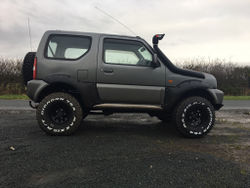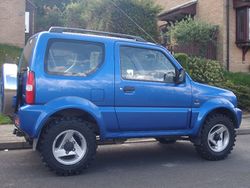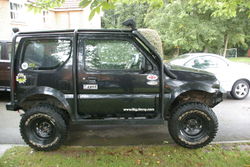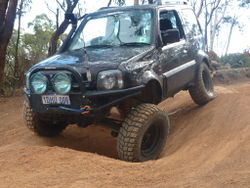![]() The content of any article might be expanded / improved in the future - revisit it sometimes.
The content of any article might be expanded / improved in the future - revisit it sometimes.
![]() Seen a mistake? Know something that isn't written? Edit and change this article yourself!
Seen a mistake? Know something that isn't written? Edit and change this article yourself!
![]() Some images in the article (if present) can be enlarged by clicking on them.
Some images in the article (if present) can be enlarged by clicking on them.
Contents
Introduction
A lot of people dream about lifting their 4WD vehicle, as they consider that to be an epitome of off-roading - a main beneficial mod for off road use.
Types of vehicle lifts
Introduction
There are three types of vehicle lifts:
- Body lift
- Suspension lift (UK: called a spacer lift)
- Longer suspension (UK: called a suspension lift)
Notes on lifts and larger tyres
The vehicle can also be lifted by installing larger (taller) tyres, which is the only way to lift the axles as well as the entire vehicle. See wiki article "Tyre selection and usage - best practices" for full details.
Maximum gain is achieved when the vehicle is lifted AND has larger tyres at the same time.
All three vehicle lifting methods increase the clearance between the wheels and the body panels, thus enabling the fitment of larger tyres. Body lift is the cheapest and simplest method if the fitment of larger tyres is the only goal. The other two lifting methods have other beneficial effects.
Body lift
General info
Body lift is the simplest type of lifts - it consists of installing spacers on the body-to-chassis mounts (on vehicles which have separate chassis and cabin, like the Jimny).
Therefore, body lift does not raise any component of the chassis or the underbody away from the ground. A key benefit is that the steering is unaffected by a body lift.
The only two purposes for lifting the body are:
- To look cool or mean on a budget (if that turns you on)
- To increase the clearance between the wheels and the body panels around the wheels. This then enables fitment of larger tyres, which in turn lift the entire vehicle.
Body lift specific notes
When considering a body lift, it is worthwhile thinking about the quality of the product. Kits vary from some square section steel tube through to custom machined billet spacers. Also, the cheap kits drill out the old threads and bolt through the resulting hole whilst some kits have machined threads and bolts that preserve the old threads.
Also, as the bumper is mounted to the chassis rails, a lift creates a gap between the top of the bumper and the rest of the body, the better kits have relocation brackets for the bumper to hide the gap.
With larger body lifts, the steering column may require extending with a spacer.
In summary, the best body lift kits contain properly machined billet spacers and bolts, with bumper relocation and steering column spacers.
Suspension lift
Suspension lift means installing spacers under/on mounts which connect axles or chassis with suspension springs and shock absorbers.
Suspension lift raises the entire vehicle apart from the axles, and is a cheap way to effectively lift a vehicle, but only for small lifts.
Beware that installing longer suspension is commonly wrongly named "suspension lift".
Installing longer suspension
Typically wrongly called "suspension lift", this procedure consists of removing your factory springs and shock absorbers and installing aftermarket-made longer springs and shock absorbers.
Installing longer suspension raises the entire vehicle apart from the axles, and typically significantly changes all dynamic driving characteristics of the vehicle, both on road and off road.
This type of lift provides the most flexibility and choice when purchasing parts and building the lift.
Benefits, issues and risks
Introduction
Vehicle lifts provide one technical and several sociological advantages.
However, vehicle lifts come with many disadvantages, costs and some serious real life risks.
Benefits
- Vehicle lifts make your vehicle look cooler or nastier (if that turns you on).
- Vehicle lifts increase the ride height, increasing your self esteem.
- Vehicle lifts improve vehicle's off roading potency, as well as your own.
- Vehicle lifts make you feel you've finally done something significant to your vehicle.
Issues
- Suspension lift or longer suspension can significantly distort or even disrupt some vehicle's systems (steering, brake, transmission).
- Suspension lift or longer suspension can financially quickly spiral out of control, as they might require extensive modifications of suspension, steering and driveline components in order to compensate for technical issues.
Disruptions of the brake and transmission can be remedied by installing extended brake hoses and installing propeller shaft spacers.
Distortion of the steering system can be remedied (or only partially mitigated for larger lifts) by installing offset radius arm bushes or (aftermarket-made) offset radius arms.
Lack of financial funds can be remedied by buying a new loan at the bank or by various crime activities.
Risks
- Vehicle lifts will make a car more unstable on the road. This is especially pronounced with suspension lift and longer suspensions.
- In some countries, in order to make the vehicle road legal, it is compulsory to perform some vehicle recertification after applying any modification the vehicle. A vehicle lift is certainly a BIG modification.
- Larger lifts may not be made road legal in some countries.
![]() UK readers: Most modifications are permitted if your insurance company will insure the vehicle and it will pass the annual MOT test. A rule of thumb is that once you start cutting parts like the chassis then an SVA is required.
UK readers: Most modifications are permitted if your insurance company will insure the vehicle and it will pass the annual MOT test. A rule of thumb is that once you start cutting parts like the chassis then an SVA is required.
![]() Modifying a vehicle can have legal consequences in some countries! The reader is responsible for checking on the local rules in their country
Modifying a vehicle can have legal consequences in some countries! The reader is responsible for checking on the local rules in their country
Additional considerations
The driving benefit of a lift highly depends on the extent (severity) of off road terrain. Jimny is already quite capable in its stock form, and slightly larger tyres might be all that is needed.
It is advisable for the driver to first drive his vehicle a bit, and experience all of his intended off-roading situations before deciding if a lift would truly be required.
For frequent road use, it is recommended to stick with a 2" suspension lift.
If you do decide to lift the vehicle up, then it would be a good countermeasure to widen its stance (to stabilize it) by installing wheel spacers on all four wheels or by using offset rims.
![]() See wiki articles "Wheel spacers" and "Offset rims" for more details.
See wiki articles "Wheel spacers" and "Offset rims" for more details.
Lift kit comparisons
| Spring comparison | ||||||||||||
|---|---|---|---|---|---|---|---|---|---|---|---|---|
| Manufacturer | Model Number | Location | Free Height (mm) | Spring rate (lbf/in) | Notes | |||||||
| A | B | |||||||||||
| Stock | 41111-81A20 | Front | 335 | 335 | 120 | Wire 10.3mm 7.25 turns | ||||||
| Rear | 288 | 288 | 120 | Wire 10.3mm 7.25 turns | ||||||||
| King | KSFR-36EH | Front | 365 | 365 | 140 | |||||||
| KSRR-37H | Rear | 325 | 325 | 165 | ||||||||
| OME 40mm | 2965 (petrol) | Front | 365 | 365 | 146 | Wire 11.5mm 10 turns | ||||||
| 2969 (diesel) | Front | 360 | 360 | 170 | Wire 12mm 9.5 turns | |||||||
| 2966 (RHD) | Rear | 335 | 315 | 176 | Wire 12mm 10 turns | |||||||
| 2967 (LHD) | Rear | 325 | 325 | 176 | Wire 12mm 9.5 turns | |||||||
| Dobinson | C57-046 | Front | 355 | 355 | 170 | |||||||
| C57-053 | Rear | 340 | 340 | 165 | ||||||||
| Trailmaster 2" | 76043 (petrol) | Front | 368 | 368 | 148 | Wire 12mm | ||||||
| 75053 (diesel) | Front | 353 | 353 | 205 | Wire 13mm | |||||||
| 76143 | Rear | 326 | 326 | 188 | ||||||||
| Trailmaster 3" | 76086 | Front | 368 | 368 | 228 | |||||||
| 76186 | Rear | 355 | 355 | 240 | ||||||||
Source:
- Stock - 2015 OME International Application Catalogue
- King - King Springs Sales and Technical Services
- OME - 2015 OME International Application Catalogue
- Dobinsons - Dobinsons Spring and Suspension International Sales
- Trailmaster - Maas Group GMBH and co.
Kits
Standard Jimny
An unmodified 2005 VVT Jimny (UK) for comparison.
Trailmaster 2" Lift kit
The Trailmaster 2" Lift
(see BigJimny Store )
Trailmaster 2" lift and Jimnybits 2" body lift
Jimny fitted with Trailmaster 2" lift and Jimnybits 2" body lift combination
Trailmaster 3" lift
Jimny fitted with Trailmaster 3" lift components
Jimnybits 2" Body lift
Jimny fitted with Jimnybits 2" Body lift
Jimnybits 2" Body lift & 2" Spring Lift
Jimny fitted with combined Jimnybits 2" Body lift and 2" Spring lift (AVO shock version)
JimnyBits 2" lift
Jimny fitted with JimnyBits 2" lift kit (Procomp shock version)
KAP Suzuki 3" lift
Jimny fitted with KAP Suzuki 3" lift kit
Tough Dog 120mm lift
- Jimny fitted with Tough Dog 120mm Lift (Australia)
- Note: I think the 120mm lift is an 80mm lift with extra spacers?
Conclusion
A stock Jimny with no lift nor spacers (apart from slightly larger tyres) can still get to most places where you intend to go, just with more skill or attempts applied (and that's the name of the game).
If you insist on lifting the vehicle, than you are most probably going "off the legal road" and you are probably entering an enchanted techno-financial spiral of re-modding the vehicle to compensate for the lift.
Page last edited on 26/01/2017 by user Bosanek










